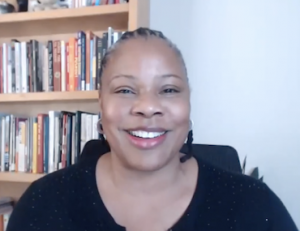On Tuesday, September 8, Bank Street Graduate School of Education welcomed a new group of graduate students, faculty, staff, and alumni at the annual Barbara Biber Convocation. The event, which is a centerpiece of orientation for incoming students and celebrates the start of the new school year, provides an opportunity for the College community to engage with seminal thinkers on leading issues in education.
 This year’s lecture, which was hosted live online, featured national education consultant and author Zaretta Hammond, a former high school and community college expository writing instructor, who spoke about instructional equity and how educators can create learning environments that maximize each child’s potential through equity-focused teaching grounded in the science of learning.
This year’s lecture, which was hosted live online, featured national education consultant and author Zaretta Hammond, a former high school and community college expository writing instructor, who spoke about instructional equity and how educators can create learning environments that maximize each child’s potential through equity-focused teaching grounded in the science of learning.
“Young children are constantly mapping their environment and the degree to which we understand how to help them leverage their schema so that they can actually carry more and more of the cognitive load as they go through…that is the core of culturally responsive education. I’m passionate to bring the science of learning into the equity conversation because too often we keep them separate,” said Hammond during her keynote presentation titled “Learning for Liberation: Supporting Young Children to Grow Their Brain Power.”
Throughout her presentation, Hammond referenced the Bank Street credo, focusing on two points: the development of “lively intellectual curiosity” and “flexibility when confronted with change.” She noted, however, that the racialized context and society that we live in often undermines that curiosity for certain children.
Hammond explained that this is part of inequity by design, which refers to how schools have historically “under-developed the cognitive information processing skills of diverse students and undermined their confidence as learners.” She described the way in which deficit mindsets and, consequently, the pathologizing of different cultural values and ways of being emerge in schools, leading to an emphasis on compliance and management above curiosity for Black and Brown children.
 “How will we create not just classrooms for students that allow them to grapple and engage in productive struggle so they get better, because that’s how we grow our gray matter, but how will we do this for educators?” asked Hammond as she expanded on the “flexibility” principle of the Bank Street credo and discussed the learning process for educators to transform their instruction and deepen their practices that support students who have been historically under-developed.
“How will we create not just classrooms for students that allow them to grapple and engage in productive struggle so they get better, because that’s how we grow our gray matter, but how will we do this for educators?” asked Hammond as she expanded on the “flexibility” principle of the Bank Street credo and discussed the learning process for educators to transform their instruction and deepen their practices that support students who have been historically under-developed.
Hammond concluded by outlining three ways educators can strengthen their equity lens and help support students in building their brain power and capacity, including reframing errors as information to provide students with opportunities to learn from mistakes, offering “active demandingness” to advance cognitive development, and leveraging diverse students’ funds of knowledge to better understand what children bring from their communities, families, and experiences.
Following the presentation, attendees participated in small group breakout discussions to share what resonated with them most before coming together again for a Q&A session with Hammond facilitated by Soyoung Park, Advisor, Bank Street Graduate School of Education.
“This work is ongoing, long-term work. This is not about a basket of strategies that are culturally responsive. This is really about how do we start to understand the science of learning so that when we’re with our students we can notice and name the ways in which their learning is happening. This is that idea of being immersed in the lives of students and teachers. ‘What are we learning?’ This is the spirit of what Dr. Biber brought to us,” said Hammond.
“Zaretta Hammond delivered a powerful and inspiring presentation to start our new school year, sharing a depth of insight on instructional equity and the science of learning,” said Cecelia Traugh, Dean, Bank Street Graduate School of Education. “We are so pleased that our students were able to hear from her and look forward to carrying this important information through our learnings this year at Bank Street.”